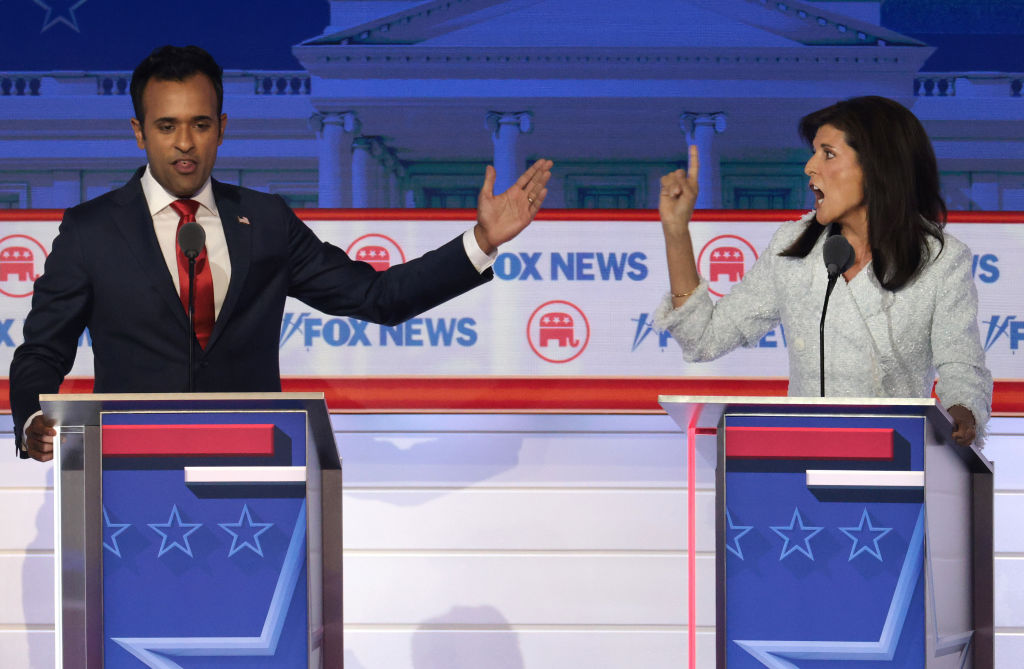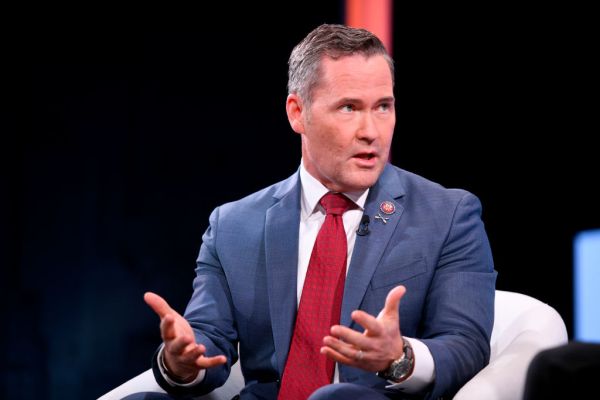Hello, and happy Sunday. Did you watch the debate on Wednesday? I have to admit, for the first hour at least, it didn’t capture my sole attention. Lionel Messi, the latest soccer superstar to have a late-career stint with an MLS team, was playing in Cincinnati, and while I’m not as much of a soccer fan as I’d like to be, well, Messi was in town. I had the TV tuned to soccer, and streamed the debate on my laptop.
The soccer game ended in heartbreaking fashion: FC Cincinnati led most of the match, only to have Inter Miami tie it in stoppage time. After each team scored a goal in overtime, keeping it tied, Miami won in penalty kicks. The debate? Well, I wasn’t rooting for anyone in particular, but one moment did stand out to me.
Vivek Ramaswamy, the 38-year-old biotech entrepreneur who seems to be running as a millennial Donald Trump, had been making an overly simplistic case that we should stop funding Ukraine’s war effort so we could use our military resources to stop the “invasion” of our southern border. When former South Carolina Gov. Nikki Haley got her chance to respond, she delivered masterfully. Some highlights:
“The American president needs to have moral clarity,” she said. “They need to know the difference between right and wrong. They need to know the difference between good and evil. When you look at the situation with Russia and Ukraine, here you have a pro-American country that was invaded by a thug. … A win for Russia is a win for China. We have to know that. Ukraine is the first line of defense for us. And the problem that Vivek doesn’t understand is, he wants to hand Ukraine to Russia. He wants to let China eat Taiwan. He wants to go and stop funding Israel.”
“You have no foreign policy experience,” the former U.S. ambassador to the United Nations concluded. “And it shows.”
Not only do I happen to agree with Haley on the merits, but she was channeling the feelings of every Gen Xer who’s ever found themselves in exasperating conversations or staff meetings with upstart, earnest millennials who think they know everything. If Nikki’s ever in the vicinity of the Ohio bureau, I’d invite her over for a Breakfast Club and Reality Bites double feature. (Just kidding! I love my many millennial friends. But the invitation stands.)
If you’re looking for more sophisticated debate analysis, we’ve got plenty. Drucker, Audrey, and Steve were in Milwaukee this week, and in Friday’s Dispatch Politics newsletter, they report that Haley has seen a bump in engagement since her solid performance. As they note, Haley’s campaign had predicted her campaign would gain strength by mid-fall, once the debates began.
Getting back to Ramaswamy: In Boiling Frogs (🔒), Nick declares him the winner of the debate. “It seemed to me (and others) that a glib, shameless, boorish, sloganeering populist ‘outsider’ brimming with shallow charisma was destined to make the biggest splash in a glib, shameless, boorish, sloganeering populist party. This would end up as The Vivek Debate. How could it be otherwise?” he writes. “Last night we got a glimpse of what a post-Trump Republican Party might look like. Surprise: It sucks.”
In The Collision, Sarah and Mike Warren discuss how the candidates on the debate stage handled what co-host Bret Baier described as “the elephant not in the room.” And while the candidates didn’t exactly take an “out of sight, out of mind” approach to Donald Trump, none of them seemed interested in making a sustained case against the frontrunner. Most, for example, responded to questions about his various indictments with concerns about what they see as the “weaponization” of the Justice Department. “And with that, the issue of Trump’s indictments—which is likely to define a general election with Trump as the nominee—seemed to dissipate as an issue for the Republican presidential primary,” Sarah and Mike write.
If you wish the candidates on stage had, er, a different set of incentives, be sure to check out Kevin’s debate preview that imagines himself as the moderator with a state-of-the-art Acme B.S. Detector at his disposal. “We have Mitch Daniels standing by with the controls in hand, and, if you try to wholesale the kind of bull you normally feed gullible Republican primary voters and fawning Fox News types to our audience, then it is ZAP! right in the ’nads.”
We also did something a little special this week, hosting our weekly Dispatch Live streaming discussion at 11 p.m. ET on Wednesday, right after the debate. Mike and Kevin held down the fort, Sarah and Jonah checked in, and Steve and Drucker offered their analysis from on the ground in Milwaukee. There was even a special guest appearance from our favorite New York Times columnist and Advisory Opinions co-host. These live events and the archival video are normally reserved for Dispatch members only, but this was such a great conversation I’m going to share it here for everyone. If you want to be able to tune in to the next one, well, you know what to do: Join now!
Thanks for reading, and enjoy the rest of your weekend.
The Biden administration finally acquiesced to Ukraine’s request for F-16s, but logistical issues means it will be months before the fighter jets are able to be deployed on the battlefield. That’s bad news for Ukraine for obvious reasons, but it’s also detrimental to Biden’s own efforts to continue funding the Ukrainian war effort, with House Republicans pointing to the war’s stalemate as a reason not to approve additional support. How daunting is the task the Ukrainians face? One expert tells Charlotte that, “It’s just a matter of time until Ukraine is going to need to replace its existing fleet of aircraft, either because they are destroyed in combat or because they just get so old and can no longer be safely flown” and another tells her that Ukraine’s armored units are “dangerously exposed.” On the bright side, some Ukrainian pilots are already being trained in Europe and others are expected to begin training at U.S. bases by October.
Four indictments. Four coming trials, in four separate jurisdictions. One defendant. How does that work? It’s complicated. There isn’t much precedent for this situation—especially given the defendant is running for the presidency and the election is a little more than a year away—but Price does his best to sort out the logistical mess created by Donald Trump’s many felony counts. A lot of it will come down to judges coordinating among themselves, and lawyers contending that certain dates might not work because of commitments in another jurisdiction. As Price notes, Trump has every incentive to slow things down, while special counsel Jack Smith—who brought both the classified documents case and the federal election fraud case—wants to get moving. Either way, expect a lot of uncertainty. “Some judges might be inclined to think that federal cases trump state cases, but that’s by no means a hard and fast rule,” Price writes. “Similarly, routine trial calendar conflicts might sometimes be sorted out by seniority, with longer-tenured judges getting priority—but that kind of determination would usually happen within the same district, not across the wide array of jurisdictions Trump has been charged in.”
Law review articles don’t normally have the virality of a Taylor Swift Instagram post. But the authors of a forthcoming University of Pennsylvania Law Review article took to the New York Times to preview the paper, in which they argue that Section 3 of the 14th Amendment—which relates to anyone who has “engaged in insurrection or rebellion” against the United States—bars Trump from public office. With some assistance from King James II and Steve Gutenberg (just trust me, it works), Jonah weighs in in Wednesday’s G-File (🔒), noting that “the Constitution is one of the greatest examples of rule-setting in human history” but also “a meaningless object, absent the willingness of the people to imbue it with meaning.” Therefore, the 14th Amendment argument doesn’t mean that much to him. “The only way we end up being constrained by the Constitution is by people taking action to see that the Constitution—or their interpretation of it—is faithfully followed and enforced,” he writes. “Nothing will happen to keep Trump from running unless someone, somewhere, does something about it.”
And here’s the best of the rest.
- Harvest takes a look at the legal fights between the Biden administration and Texas Gov. Greg Abbott over the southern border. Abbott’s administration has installed “buoy barriers” in the Rio Grande to discourage illegal immigration, but the Justice Department says the barriers run afoul of environmental laws and create humanitarian concerns.
- Nevada’s state GOP is a mess, perhaps an unsurprising statement in the, um, interesting times in which we live. But Chris Stirewalt points out that the party chairman’s effort to shake up the state’s nominating contest will have ripple effects on the GOP presidential primary.
- During the debate, Ron DeSantis argued that we should send special operations forces across the border to engage with the Mexican drug cartels that are contributing to our fentanyl crisis. Contributor Kevin Carroll highlights one of the problems with this idea. We already have a military program for this purpose: maritime interdiction.
- And the pods: On Advisory Opinions, David French and Sarah dive into the argument that the 14th Amendment renders Trump ineligible for office. On The Dispatch Podcast, the gang argues that the debate was “not worth your time.” And on The Remnant, Jonah welcomes Robert P. George to discuss the rise of illiberalism.









Please note that we at The Dispatch hold ourselves, our work, and our commenters to a higher standard than other places on the internet. We welcome comments that foster genuine debate or discussion—including comments critical of us or our work—but responses that include ad hominem attacks on fellow Dispatch members or are intended to stoke fear and anger may be moderated.
You are currently using a limited time guest pass and do not have access to commenting. Consider subscribing to join the conversation.
With your membership, you only have the ability to comment on The Morning Dispatch articles. Consider upgrading to join the conversation everywhere.